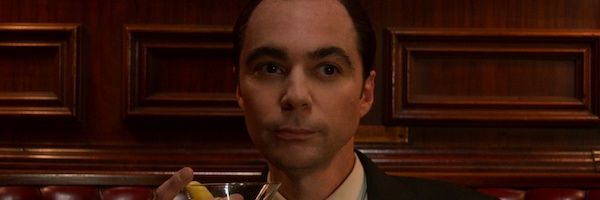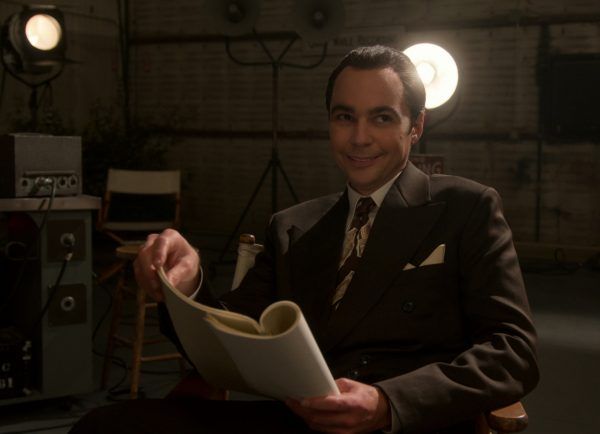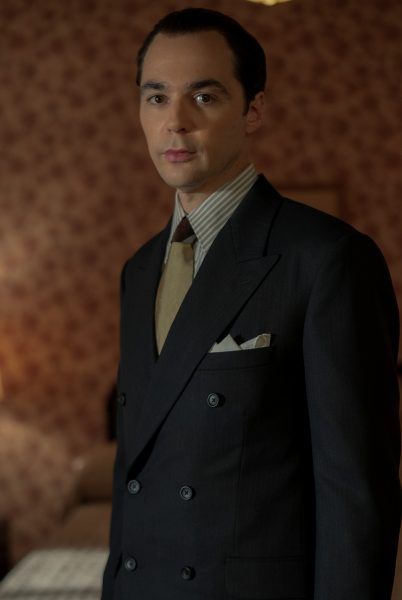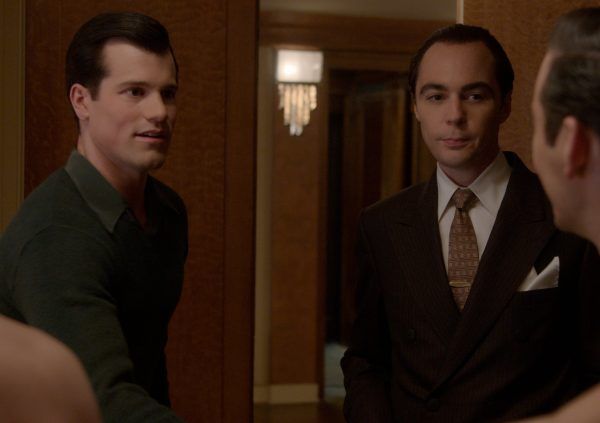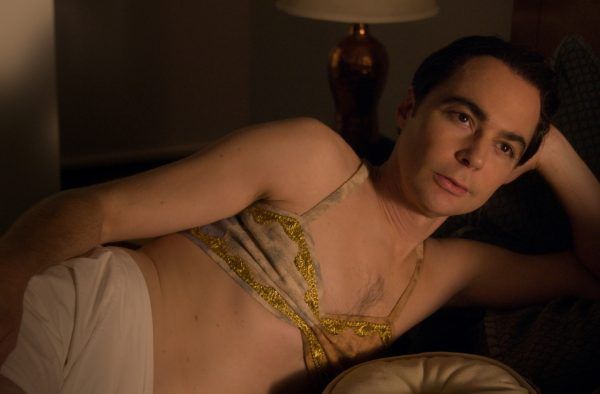With the upcoming award season shining a spotlight on exceptional programming and performances, even though there are a lot of TV shows and various networks and streaming services with countless shows to choose from, there are still some real stand-outs. One such performance is the work of Jim Parsons in Hollywood as Henry Wilson, a manipulative agent who has a proven record of developing big movie stars.
During this 1-on-1 phone interview with Collider, Parsons talked about why he loves working with executive producer Ryan Murphy, his uncanny ability to see the capabilities or possibilities in the individuals that he hires in front of and behind the camera, the toxic dynamic between Henry and Rock Hudson (Jake Picking), the incredible attention to detail on the set of Hollywood, whether he’d ever been asked to do American Horror Story, his incredible experience doing The Boys in the Band on stage and for the upcoming movie, and how he’s approaching his career, post-Big Bang Theory.
Collider: I would imagine that whenever Ryan Murphy has something going on that he tells you about, you probably pay more attention than just a random project, but what was it about this, in particular, that appealed to you? Was it the time period, the insane cast, or just everything, in general?
JIM PARSONS: It was mostly Ryan, and the cast that he was assembling. He came and said, “I’m doing this new thing. There’s a character that I’d love for you to play. It’s unlike anything that you’ve played. I’ll send you the first couple of scripts, so you can read it and think about it.” And I went home and told my husband, “It’s so nice that he’s going to give me the scripts, but there’s no way that I’m not doing it.” I don’t just love working with Ryan, but Ryan has, around him, a group of people that I really consider, to varying degrees because I don’t know everybody that well, an artistic family or a troupe. Family sounds a little too out there. So many jobs in this industry, I’m sure you know, don’t happen ‘cause of auditions or ‘cause an agent finds them. They’re just people that you’ve worked with before, who are like, “Okay, we seem to get along and have something in common, sensibility wise,” and Ryan is very much that, for me. Timing wise, in my career, having come off of the show and everything, I don’t know, it felt like the universe was like, “Here you go, take another walk with Ryan and see what happens.” So, I felt pretty emotionally committed before I knew who Henry, the character, was. I didn’t have a big knowledge of the era either – the ‘40s in Hollywood. I’ve certainly seen movies from then, and it’s such a beautiful era to look at. I’ve seen pictures, and other replications and productions. But it wasn’t until I started having to research Henry, and working on the set and in those clothes, that I really started to get an affinity for it. It was the first time that I realized what I kept calling the wild, wild west nature of Hollywood. I logically understood that Hollywood obviously had to start, at some point, but this was still a very formative period of people figuring out their roles there, and what jobs they wanted to, and what jobs were needed. Henry, himself, was an “agent,” but he was really was one of the first managers, looking back on it, with his personal take and having a farm of clients that he worked with and tried to mold.
When you’re a part of a Ryan Murphy production, is it a very collaborative environment, or is it more that everybody there just trusts in him and feels safe in his hands?
PARSONS: It’s interesting, it’s a collaborative environment because people do feel in safe hands with Ryan. Ryan has such a strong vision, but you feel, at all turns, or I always have, working with Ryan, and I get the vibe from everybody else, like somebody has your back. And that’s not even the right way to put it ‘cause it’s not that you won’t argue and say, “No, let’s do it a different way,” than the way that you come with, but there is no risk that you will take that will overextend you or make you feel stupid. If your heart’s in the right place, it won’t get you fired. You’re really allowed to go out there and play. For me, this role was a really good example of how I feel about him. I don’t imagine that I would’ve felt as in heaven and as on a playground, as I did, in many other people’s hands. There was just something about knowing that Ryan was heading it up. It’s rare to be surrounded by so many people, in so many departments, that feel like they’re just working at the most electric, creative, vibrancy of their careers, possibly. I don’t know that I’ve ever worked with a more all-around creative energy force, from everybody, in every department, than I have in a Ryan show, in general, but on this one, specifically, I have to say.
He works with the same actors a lot, and he clearly sees things in them that they often don’t see in themselves. This is not a character that we’ve seen you play before, and I would imagine it’s probably not a character that, if this had just come to you, you wouldn’t have thought of playing, if it hadn’t been Ryan Murphy, which is really cool.
PARSONS: It is. It’s a major gift-giving ability, on his part. It’s something about his intelligence and his intuition , where he isn’t just a, “Let’s have fun,” gift giver. You hit it on the head, he seems to have an uncanny way of seeing capabilities or possibilities in people, be they actors or costumers, or anybody. And once he says it to you, it works on two levels for you, or it does for me, at least. Number one, he hit on something that was already there, that he was able to see that I wasn’t, so you feel a confidence with it. But there’s also just the fact that Ryan, by saying it, makes you go, “Oh, of course I can,” and you suddenly find yourself doing these things that I’m not sure I would do, in another person’s hands.
The relationship between your character and Rock Hudson is certainly an interesting one. How was it to dig into that dynamic, which does border on being a bit toxic and abusive. Did you have a lot of conversations with your scene partner, Jake Picking?
PARSONS: The only awkward, hard part was the first couple of times on set. We had never met, and the first time we met, there was a scene where we were both basically screaming at each other, which was odd, for many reasons, certainly just meeting this person. And then, the next thing we had was when I take him on as a client. They cut the final edit of this, which went further in the scene. It wasn’t graphic, as far as showing anything, but it was him taking his pants down and me going out of frame, and it was an excessively intimate situation. Once we had done that though, we had so much joy in playing around with the dynamics of their relationship and their power struggle. The thing about Rock was that he actually was very successful, ultimately. I feel like one of the things that Jake brought to the role was a beautiful innocence, but he was also somebody who was extremely driven. He was basically as driven as Henry was, they just were different. I said on set, “There are all of these couples on this show, but really, Henry and Rock are the Ross and Rachel of Hollywood.” It was a stupid joke, but really what I was getting at was that it is, for all of its toxicity, and partly because of it, a really complex relationship. It is the weird successful agent-actor relationship, times 10 taken and taken to its worst degree. By nature, this symbiotic relationship is complicated. They were both gay men that were not allowed to be publicly out.
When you’re on a set like this and attention is paid to every little details, and the clothes and the styling are to die for, does that make things that much easier?
PARSONS: Yes, unlike any production I’ve ever worked on before, I have never felt as transported. It sounds like something easy to say, and there are different and varying degrees of feeling that on any set, certainly, but this was commented on by lots of us, at different times on the set because it was truly a bit of a mind trick, at times. Obviously, you consciously knew that you weren’t of that era, but with the clothes, the make-up, the hair and the sets, everyone looked like they were right out of that era and it only added to your own feeling when you looked in the mirror and went, “I’m right there. How is this possible?” There was a magical quality to it. It was one of the most creative, vibrant environments that I’ve ever been in, with the level of invention followed through from every angle. That’s what was transportive about it.
You hadn’t done American Horror Story. Had you ever talked to him about the possibility of doing that series before, or were you not able to because of Big Bang Theory?
PARSONS: Whether it was because of Big Bang or not, and time schedules and stuff, it had never come up. I had done the Normal Heart movie with him, and then he produced The Boys in the Band for Broadway. And so, those are my two major things with him. But no, another topic like that had never come up, which was part of the reason that I was so pleasantly surprised when he came to ask, and why I felt myself jump at it. It was so out of left field, but it felt natural. It felt like a gift, and that’s exactly what the experience turned into. That’s not to say that every day was roses, but it was much more fun and rewarding than I would’ve ever guessed it to be.
You also had a very unusual experience with The Boys in the Band, going from the Broadway stage production, and then getting to do a movie version, which is not something that happens very often and definitely doesn’t happen with the same cast very often. What was that experience like, getting to explore the material in two different mediums?
PARSONS: To your point, one of the things that I said, several times while we were working on the movie, was that this is probably a once in a lifetime experience because it’s, like you say, it’s just so rare. Even if a play gets made into a movie, for it to be the exact same cast is unheard of, other than the first The Boys in the Band movie. One day on set, Matt Bomer kiddingly said something out of truth, but that really hit it on the head, which was, “I never want to do a movie again that I haven’t done a full Broadway run of.” And it was so on the nose because there was a second-hand language and knowledge. We’d lived so much with the material that there were so many questions that you didn’t need to ask. There were so many times that you could just let yourself respond, and you weren’t even aware of how informed your choices were, because you had been doing it for so long. It was heaven. Not only do you not normally get to live with material that long, but to shake it up like that, and to take this really well-ingrained knowledge from the Broadway run, and then throw it onto a completely different set, with different costumes, and a completely different situation, it was the perfect combination of a great foundation from the Broadway run and all of these new stimuli. I would imagine that’s the only time that I’ll ever get to do that, which is a shame. It’s a hell of a way to work, I’ll say that.
Since you’re in this unique position, where you really only have to do what you want to do and you don’t have to worry about the next paycheck, have you thought about what that means for you and what you would like to do next, in your career? Are there things that you feel like haven’t come your way, that you’d like to somehow make happen?
PARSONS: Yes and no. I would say that the yes is that I am hungry to get the chance to try new things, in a very general sense, and some of that is not even with acting. Some of that is taking an art class, or taking a creative writing class, and just trying to do all of these other things. But more specifically to the Hollywood business of it all, this sounds so hippie, but I’m trying to learn how to listen to myself and really hear what it is that I want. It really is an unbelievably fortunate position that I’m in, and the hardest part is that it’s such a new position for me, that it’s hard for me. It’s nice to hear, “Now what do you really, really, really want to do?,” as opposed to saying, “Well, I need to do this now. It makes sense to do this now.” Shedding some of that old way of thinking, I feel I’m still very early in the process of. But I would say that time and experience is answering that for me. This trip with Ryan was a real stepping stone, in that direction. The way I felt about it, when he approached me about doing it, was going, “I feel that, somewhere deep inside me, this makes sense.” It wasn’t business wise, or wanting to do Ryan a favor. It was nothing like that. It felt like an inspirational thing to do. I was like, “If everything could feel like this, I would just try to work back to back to back to back.” But they’re not, and you just have to try to feel your way. I feel like an astrology reading hippie, saying it like that, but it’s the truth.
Hollywood is available to stream at Netflix.

